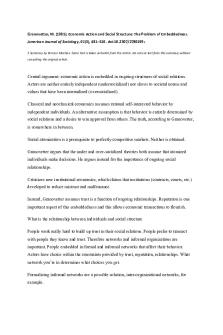Granovetter - Summary Economic Action and Social Structure: The Problem of Embeddedness PDF

| Title | Granovetter - Summary Economic Action and Social Structure: The Problem of Embeddedness |
|---|---|
| Course | StuDocu Summary Library EN |
| Institution | StuDocu University |
| Pages | 1 |
| File Size | 74.9 KB |
| File Type | |
| Total Downloads | 35 |
| Total Views | 129 |
Summary
Economic action summary...
Description
Granovetter, M. (1985). Economic Action and Social Structure: The Problem of Embeddedness. American Journal of Sociology, 91(3), 481–510. doi:10.2307/27801993 3 Summary by Terence Meehan. Some text is taken verbatim from the article. Do not use text from this summary without consulting the original article.
Central argument: economic action is embedded in ongoing structures of social relations. Actors are neither entirely independent (undersocialized) nor slaves to societal norms and values that have been internalized (oversocialized). Classical and neoclassical economics assumes rational self-interested behavior by independent individuals. An alternative assumption is that behavior is entirely determined by social relations and a desire to win approval from others. The truth, according to Granovetter, is somewhere in between. Social atomization is a prerequisite to perfectly competitive markets. Neither is obtained. Granovetter argues that the under and over-socialized theories both assume that atomized individuals make decisions. He argues instead for the importance of ongoing social relationships. Criticizes new institutional economics, which claims that institutions (contracts, courts, etc.) developed to reduce mistrust and malfeasance. Instead, Granovetter assumes trust is a function of ongoing relationships. Reputation is one important aspect of this embeddedness and this allows economic transactions to flourish. What is the relationship between individuals and social structure People work really hard to build up trust in their social relations. People prefer to transact with people they know and trust. Therefore networks and informal organizations are important. People embedded in formal and informal networks that affect their behavior. Actors have choice within the constraints provided by trust, reputation, relationships. What network you’re in determines what choices you get. Formalizing informal networks are a possible solution, inter-organizational networks, for example....
Similar Free PDFs

The Economic Problem mindmap
- 2 Pages

The Problem of Social Cost
- 1 Pages

Chapter 3 the economic problem
- 1 Pages

Annulment Summary and Structure
- 3 Pages

Structure - summary of toefl
- 72 Pages

The structure of personality
- 6 Pages

MAX Weber- Social Action
- 9 Pages

Granovetter Antwort
- 3 Pages
Popular Institutions
- Tinajero National High School - Annex
- Politeknik Caltex Riau
- Yokohama City University
- SGT University
- University of Al-Qadisiyah
- Divine Word College of Vigan
- Techniek College Rotterdam
- Universidade de Santiago
- Universiti Teknologi MARA Cawangan Johor Kampus Pasir Gudang
- Poltekkes Kemenkes Yogyakarta
- Baguio City National High School
- Colegio san marcos
- preparatoria uno
- Centro de Bachillerato Tecnológico Industrial y de Servicios No. 107
- Dalian Maritime University
- Quang Trung Secondary School
- Colegio Tecnológico en Informática
- Corporación Regional de Educación Superior
- Grupo CEDVA
- Dar Al Uloom University
- Centro de Estudios Preuniversitarios de la Universidad Nacional de Ingeniería
- 上智大学
- Aakash International School, Nuna Majara
- San Felipe Neri Catholic School
- Kang Chiao International School - New Taipei City
- Misamis Occidental National High School
- Institución Educativa Escuela Normal Juan Ladrilleros
- Kolehiyo ng Pantukan
- Batanes State College
- Instituto Continental
- Sekolah Menengah Kejuruan Kesehatan Kaltara (Tarakan)
- Colegio de La Inmaculada Concepcion - Cebu







